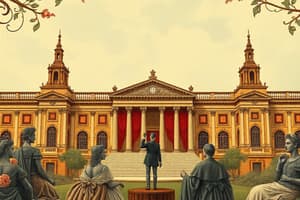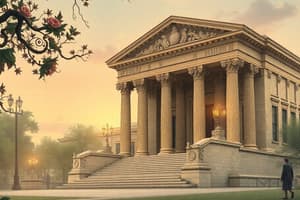Podcast
Questions and Answers
What was the purpose of the Judiciary Act of 1789?
What was the purpose of the Judiciary Act of 1789?
- To authorize the Supreme Court to issue writs of mandamus (correct)
- To limit the powers of the Supreme Court
- To define the role of the federal judiciary in political questions
- To establish the Supreme Court as the highest appellate court
Which landmark case established the principle of judicial review?
Which landmark case established the principle of judicial review?
- Marbury v. Madison (correct)
- Brown v. Board of Education
- McCulloch v. Maryland
- Gibbons v. Ogden
What concern did Brutus express regarding the independent judiciary?
What concern did Brutus express regarding the independent judiciary?
- It would create a direct oversight over Congress.
- The judiciary would have the power to control military forces.
- It would ensure the supremacy of state courts over federal courts.
- Judges serving for life would lack accountability. (correct)
According to Federalist No. 78, what is necessary for the judicial branch's independence?
According to Federalist No. 78, what is necessary for the judicial branch's independence?
What power does the judicial branch primarily rely on, according to the content?
What power does the judicial branch primarily rely on, according to the content?
What does the political question doctrine imply for the Supreme Court's involvement in certain issues?
What does the political question doctrine imply for the Supreme Court's involvement in certain issues?
Which statement best reflects the consequences of judicial review established by Marbury v. Madison?
Which statement best reflects the consequences of judicial review established by Marbury v. Madison?
What is one limitation on the judicial branch's power?
What is one limitation on the judicial branch's power?
What role does Congress play in relation to court decisions?
What role does Congress play in relation to court decisions?
Which of the following best describes judicial activism?
Which of the following best describes judicial activism?
What is a characteristic of strict constructionism?
What is a characteristic of strict constructionism?
What does the doctrine of Stare Decisis emphasize?
What does the doctrine of Stare Decisis emphasize?
Which of the following accurately distinguishes between binding and persuasive precedent?
Which of the following accurately distinguishes between binding and persuasive precedent?
What is a potential disadvantage of following the doctrine of Stare Decisis?
What is a potential disadvantage of following the doctrine of Stare Decisis?
How can presidential appointments influence judicial precedent?
How can presidential appointments influence judicial precedent?
What does judicial restraint advocate for regarding the role of courts?
What does judicial restraint advocate for regarding the role of courts?
Which action can Congress take to influence the implementation of a policy?
Which action can Congress take to influence the implementation of a policy?
What constitutional provision allows Congress to establish offices and define their powers within the bureaucracy?
What constitutional provision allows Congress to establish offices and define their powers within the bureaucracy?
Which type of bureaucratic organization enforces rules for public interest and is led by boards that can only be removed for cause?
Which type of bureaucratic organization enforces rules for public interest and is led by boards that can only be removed for cause?
How does the President influence federal agencies?
How does the President influence federal agencies?
What is the purpose of the Hatch Act of 1939 in terms of bureaucratic neutrality?
What is the purpose of the Hatch Act of 1939 in terms of bureaucratic neutrality?
Which of the following correctly characterizes the relationship in an Iron Triangle?
Which of the following correctly characterizes the relationship in an Iron Triangle?
Which of the following is true about administrative adjudication in the bureaucracy?
Which of the following is true about administrative adjudication in the bureaucracy?
What effect does the Civil Service Reform Act of 1978 have on the bureaucracy?
What effect does the Civil Service Reform Act of 1978 have on the bureaucracy?
In what way do quasi-legislative agencies contribute to the implementation of federal law?
In what way do quasi-legislative agencies contribute to the implementation of federal law?
Which power does Congress use to ensure the accountability of the bureaucracy?
Which power does Congress use to ensure the accountability of the bureaucracy?
What is one of the main characteristics of independent executive agencies?
What is one of the main characteristics of independent executive agencies?
How can the executive branch utilize its authority over the judicial branch?
How can the executive branch utilize its authority over the judicial branch?
What is the primary role of the Government Accountability Office?
What is the primary role of the Government Accountability Office?
What does public comment period help achieve in the rule-making process?
What does public comment period help achieve in the rule-making process?
Flashcards
Judicial Review
Judicial Review
The power of the Supreme Court to determine if laws are constitutional.
Marbury v. Madison
Marbury v. Madison
Landmark Supreme Court case that established judicial review.
Judicial Independence
Judicial Independence
The principle that judges should be free from political pressure when making decisions.
Writ of Mandamus
Writ of Mandamus
Signup and view all the flashcards
Article 3
Article 3
Signup and view all the flashcards
Judiciary Act of 1789
Judiciary Act of 1789
Signup and view all the flashcards
Political Question Doctrine
Political Question Doctrine
Signup and view all the flashcards
Judicial Branch Independence
Judicial Branch Independence
Signup and view all the flashcards
Stare Decisis
Stare Decisis
Signup and view all the flashcards
Binding Precedent
Binding Precedent
Signup and view all the flashcards
Persuasive Precedent
Persuasive Precedent
Signup and view all the flashcards
Precedent
Precedent
Signup and view all the flashcards
Judicial Activism
Judicial Activism
Signup and view all the flashcards
Judicial Restraint
Judicial Restraint
Signup and view all the flashcards
14th Amendment Rights
14th Amendment Rights
Signup and view all the flashcards
Constitutional Precedent
Constitutional Precedent
Signup and view all the flashcards
Gun-Free Zones Act
Gun-Free Zones Act
Signup and view all the flashcards
Fiscal Federalism
Fiscal Federalism
Signup and view all the flashcards
Executive Orders
Executive Orders
Signup and view all the flashcards
Judicial Appointments
Judicial Appointments
Signup and view all the flashcards
Necessary and Proper Clause
Necessary and Proper Clause
Signup and view all the flashcards
Cabinet Departments
Cabinet Departments
Signup and view all the flashcards
Independent Executive Agencies
Independent Executive Agencies
Signup and view all the flashcards
Independent Regulatory Commissions
Independent Regulatory Commissions
Signup and view all the flashcards
Government Corporations
Government Corporations
Signup and view all the flashcards
Administrative Disretion
Administrative Disretion
Signup and view all the flashcards
Administrative Adjudication
Administrative Adjudication
Signup and view all the flashcards
Iron Triangle
Iron Triangle
Signup and view all the flashcards
Issue Networks
Issue Networks
Signup and view all the flashcards
Congressional Oversight
Congressional Oversight
Signup and view all the flashcards
Presidential Influence
Presidential Influence
Signup and view all the flashcards
Study Notes
Judicial Branch
- Fundamentally established in Article 3
- Original and appellate jurisdiction
- Treason
- Judiciary Act of 1789
- Authorized SCOTUS to issue writs of mandamus: order public officials to perform duties
- Marbury v. Madison (1803)
- Secretary of State Madison refused to deliver commission to new judge Marbury
- Marbury asked SCOTUS to issue writ of mandamus to Madison
- SCOTUS declared the writ unconstitutional, establishing judicial review
- Marbury had right to sue, but not in the SCOTUS
- Established the political question doctrine
- SCOTUS refused to get involved (seemingly political)
Judicial Independence
- Most independent branch
- Federalists vs. Anti-Federalists debate background:
- Brutus 15: dangers of a new judiciary with life tenure
- Concerns that the judiciary would lack accountability to Congress and electorate
- Deciding constitutionality would make the branch overpower legislature and other states courts
- Federalist 78: Hamilton's argument for lifetime tenure of judges
- Holding office during good behavior is a barrier between Congress and president
- Secures a steady and upright administration
- Judicial independence:
- No threat from military force or funds management
- Only "power of the pen" (interpreting laws)
- Constitution is a national law; needs a national court to interpret meaning
- Other branches prevented from acting unconstitutionally
Judicial Review
- Established by Marbury v. Madison
- Checks constitutionality of legislative, executive, and state actions
- Laws deemed unconstitutional are void
- Example: Brown v. Board of Education (1954): racial segregation in public schools
Precedent
- Prior rulings, holdings (reasoning behind a decision)
- Courts use holding to establish rule of law in similar cases
- Binding precedent: from higher courts
- Persuasive precedent: from similar courts in same region or neighboring levels; courts may want to "take into account"
- Stare decisis: rely on past precedent, considering significant differences, level of court, and avoiding devices
- Allows new precedents to evolve
Judicial Activity pros and cons
-
Pros:
- Guidance, stability, consistency, predictability
- Efficiency (settled)
-
Cons:
- Incorrect decisions impacting more cases (before overturned)
- Judges limited by settled law (even in disagreement)
- Ideological shifts: presidential appointments can affect ideological change; presidential influence leads to new precedents from same party
-
Judicial Activism vs. Judicial Restraint
- Judicial activism: believes courts should uphold "guardian ethic" which resolves social/political problems by interpretation of "living document" and sometimes striking down laws
- Judicial restraint: believes states and other branches should primarily handle political/social issues; views the Constitution as a "document" with fixed rules from "original intent"
Checks and Balances on Judicial Branch
- Congress can impact court decisions
- Modify the impact of a Supreme Court decision
- US vs. Lopez (1995)
- Congress rewrote the Gun-Free School Zones Act
- Congress can conduct oversight, pass amendments, conduct hearings, adjust funding to impact policy
- Executive branch:
- Refuses to enforce decisions
- Creates executive orders to address decisions
- Influence of judicial appointments to change the ideological makeup of SCOTUS
Studying That Suits You
Use AI to generate personalized quizzes and flashcards to suit your learning preferences.




